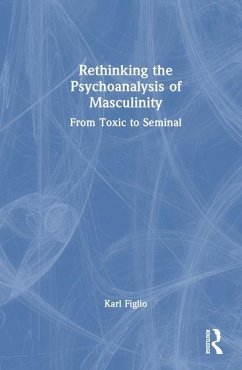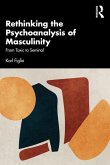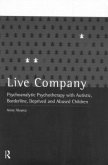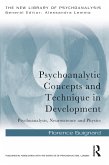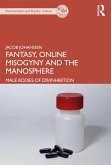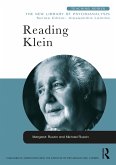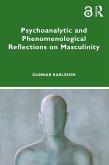Drawing on a broad range of psychoanalytic, cultural and social influences, the author examines the concept of toxic masculinity for how it brings into focus a widespread anxiety about toxicity throughout daily life: In nature, society and personal relationships.
Aggressive, misogynistic masculinity has become a major topic in recent years, spreading throughout popular culture, the media and research. Often called 'phallic,' it simmers in everyday life and hits the headlines for turning florid and violent in maintaining its dominance, especially towards women. But at the extreme, phallic masculinity has recently crystallized in a very different form, as toxic masculinity, and 'toxic' has become the near-universal epithet for all forms of extreme destructiveness in a 'toxic culture.' It has brought into focus, and named as masculine, an anxiety over toxicity in every corner of everyday life. Exploring toxic masculinity in depth brings out a misogynistic current that pervades individual and social realms, but also throws a sharp light on normal masculinity. By elaborating on the roots of this toxicity, Figlio is able to draw out a different, more positive alternative for masculinity, with particular reference to the underlying fears around fertility and the seminal.
With a strong research and clinical base, this book is essential reading for all psychoanalysts and psychoanalytic psychotherapists and cultural and social theorists interested in exploring concepts of masculinity.
Aggressive, misogynistic masculinity has become a major topic in recent years, spreading throughout popular culture, the media and research. Often called 'phallic,' it simmers in everyday life and hits the headlines for turning florid and violent in maintaining its dominance, especially towards women. But at the extreme, phallic masculinity has recently crystallized in a very different form, as toxic masculinity, and 'toxic' has become the near-universal epithet for all forms of extreme destructiveness in a 'toxic culture.' It has brought into focus, and named as masculine, an anxiety over toxicity in every corner of everyday life. Exploring toxic masculinity in depth brings out a misogynistic current that pervades individual and social realms, but also throws a sharp light on normal masculinity. By elaborating on the roots of this toxicity, Figlio is able to draw out a different, more positive alternative for masculinity, with particular reference to the underlying fears around fertility and the seminal.
With a strong research and clinical base, this book is essential reading for all psychoanalysts and psychoanalytic psychotherapists and cultural and social theorists interested in exploring concepts of masculinity.
'The psychoanalytic understanding of male sexuality has tended towards overemphasising the penis, and scotomotising the testicles. The dominance of this discourse has served to maximise exploration of the phallic and minimise interest in the generative aspects (the seminal), both clinically and socially. Karl Figlio, a highly respected psychoanalytic clinician, has spent his professional life exploring the boundaries between psychoanalysis and culture. This book is exemplary in this respect showing the interpenetration of the individual and the social. It makes a profound contribution to our understanding of male sexuality and is particularly timely, as toxic male sexuality is an increasingly dominant feature of our world.'
David Bell is a psychoanalyst and former president of the British Psychoanalytic Society and currently chair of its applied section. He retired in 2021 after 25 years as a consultant at the Tavistock and Portman NHS Foundation Trust
'Toxic masculinity is a concept now reached for as if it were a given, not a matter for enquiry. This scholarly and original book offers a fresh look at the roots of masculine identity, linking the other fashionable theme of masculine fragility to the defence provided by the phallic omnipotence at the heart of what we mean by toxic. Figlio argues with vigour and eloquence for a more complex understanding of male anxieties, emphasising the procreative power of the male and the inevitable dread of failure to create. This builds a bridge to shared thinking about what we humans most desire and fear the loss of, men and women.'
Margaret Rustin is a child, adolescent and adult psychotherapist, Tavistock and Portman NHS Trust and British Psychoanalytic Society
'Professor Karl Figlio has broadened my professional and personal horizons with this highly original book. By introducing seminal masculinity, he is venturing beyond the traditional limitations of thinking about men in reductionist, phallic terms. With its important theoretical elucidations enriched by carefully selected clinical material and links to timely social issues, this groundbreaking work contributes greatly to deepening our thinking about masculinities.'
Sebastian Thrul, senior psychiatrist and head of the clinic for Gender Issues at Psychiatrie Baselland, Switzerland, and host of the podcast New Books in Psychoanalysis
'Karl Figlio brings a fresh perspective to the debates on masculinity. He argues that "toxic masculinity" represents a triumph of the negative aspect of a more complex and inherently ambivalent masculine configuration which he terms "seminal masculinity". While seminal masculinity embodies a life-giving and reparative capacity, toxic masculinity aims omnipotently to dominate, control and anhilate the feminine. Toxic masclinity cannot make use of feminine sexuality and receptivity, so identity is also impoverished, while often "hiding in plain sight" in the familiar stereotype of phallic masculinity. Its misogyny is also a primitive form of replacement ideology.'
Sharon Numa is a fellow of the British Psychoanalytical Society
David Bell is a psychoanalyst and former president of the British Psychoanalytic Society and currently chair of its applied section. He retired in 2021 after 25 years as a consultant at the Tavistock and Portman NHS Foundation Trust
'Toxic masculinity is a concept now reached for as if it were a given, not a matter for enquiry. This scholarly and original book offers a fresh look at the roots of masculine identity, linking the other fashionable theme of masculine fragility to the defence provided by the phallic omnipotence at the heart of what we mean by toxic. Figlio argues with vigour and eloquence for a more complex understanding of male anxieties, emphasising the procreative power of the male and the inevitable dread of failure to create. This builds a bridge to shared thinking about what we humans most desire and fear the loss of, men and women.'
Margaret Rustin is a child, adolescent and adult psychotherapist, Tavistock and Portman NHS Trust and British Psychoanalytic Society
'Professor Karl Figlio has broadened my professional and personal horizons with this highly original book. By introducing seminal masculinity, he is venturing beyond the traditional limitations of thinking about men in reductionist, phallic terms. With its important theoretical elucidations enriched by carefully selected clinical material and links to timely social issues, this groundbreaking work contributes greatly to deepening our thinking about masculinities.'
Sebastian Thrul, senior psychiatrist and head of the clinic for Gender Issues at Psychiatrie Baselland, Switzerland, and host of the podcast New Books in Psychoanalysis
'Karl Figlio brings a fresh perspective to the debates on masculinity. He argues that "toxic masculinity" represents a triumph of the negative aspect of a more complex and inherently ambivalent masculine configuration which he terms "seminal masculinity". While seminal masculinity embodies a life-giving and reparative capacity, toxic masculinity aims omnipotently to dominate, control and anhilate the feminine. Toxic masclinity cannot make use of feminine sexuality and receptivity, so identity is also impoverished, while often "hiding in plain sight" in the familiar stereotype of phallic masculinity. Its misogyny is also a primitive form of replacement ideology.'
Sharon Numa is a fellow of the British Psychoanalytical Society

